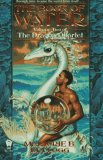
 The Book of Earth by Marjorie B. Kellogg
The Book of Earth by Marjorie B. Kellogg
Erde, the daughter of a German noble, is suddenly and terribly thrust into a world of magic and fear when she is accused of a crime she did not commit. After fleeing her father’s wrath and the insane ravings of a power-hungry priest, Erde heads into the mountains to be joined by a small, clumsy, surprisingly un-fantastic dragon named Earth.
Earth knows that he is called to a higher purpose, he just does not know exactly what. Content to put as much distance between her father and herself as possible, Erde and Earth go on the run and are joined by an unexpected cast of characters including Hal, a knight past his prime with no lands to call his own, his mule who has an uncanny ability to choose the swiftest roads and “talk” to certain people, and an old she-goat who flatly refuses to allow Earth to eat her. The unlikely team must navigate their way through unknown obstacles and face many dangers to help Earth remember and seek out his higher purpose.
I had mixed feelings about The Book of Earth throughout the entire reading. It started out slow, then got better, then started dragging again, got really, really good, then dropped off in the middle of the climax, and eventually led to a strange and anti-climatic ending.
Now, that’s not to say The book of Earth wasn’t entertaining. It definitely had its moments that made it worth reading. Erde is an exceptionally likable character despite the fact that she hardly speaks throughout the entire story. Hal, the displaced knight, is also a great character despite the fact that he plays an overly-protective father figure who becomes annoying at times, as fathers will, I suppose. Earth, the dragon, is also likable and has some very cute characteristics that make you want to hug him. He’s insanely clumsy, purrs when he is petted, and lets his tongue hang out of the side of his mouth like a dog. He does, however, lack some of the endearing characteristics that fans of Inheritance will have come to enjoy — such as the ability to speak. This lack of features — while annoying — do not really detract from the story however and, if anything, adds to the mystery a little bit.
My biggest gripe is that at the end and highpoint of the climax, Marjorie Kellogg breaks stride and we end up with a long soliloquy that detracts from the main theme that she successfully had going. It created a sense of surprise when the story finally came to a close and left me feeling kind of like: “That’s it? What the heck happened?” I also felt that Kellogg should have taken the leap into a fantasy world. Putting The Book of Earth in medieval Europe did not suit the story one bit. In fact, it became hard to remember that you were not engrossed in a fantasy world completely and it would have served her better to just create a new world that could have been more easily molded to her ideas and perhaps would have made the plot less tedious at times.
Overall The Book of Earth left me with a feeling of extreme…indifference. I wasn’t sad that the book was over, wasn’t glad I didn’t have to read any more, I was completely devoid of feeling when I finally finished. I feel no desire or sense of urgency to complete the series, and highly doubt I will anytime in the near future anyway.
![]() Julie Waineo, one of our earliest guest reviewers, earned an MBA at Bowling Green State University. She also holds a Bachelor of Arts in International Studies with a minor in French. Now living in Virginia with her husband and dog, Julie is an avid reader of not only fantasy, but historical fiction, the occasional “chick lit,” and children’s literature.
Julie Waineo, one of our earliest guest reviewers, earned an MBA at Bowling Green State University. She also holds a Bachelor of Arts in International Studies with a minor in French. Now living in Virginia with her husband and dog, Julie is an avid reader of not only fantasy, but historical fiction, the occasional “chick lit,” and children’s literature.
The Dragon Quartet — (1995-2003) Publisher: Here’s an exciting fantasy tetralogy with all the right ingredients: four elemental dragons (Earth, Air, Fire, and Water), each with a human companion. This series takes us from medieval Europe to the distant future, as the world is caught in a war between the forces of greed and fanaticism on the one hand, and the dragons and their guides and allies who seek to restore the proper natural balance to the planet on the other.






How did I miss this? Thanks for bringing it to my attention!
I guess that is true, Marion. And when it comes to "You Only Live Twice," I saw the movie TWICE…
I absolutely loved this deep dive into Edwige Fenech's giallo films! Her unique blend of allure and mystery truly captivates.…
You managed to work in your two loves; vintage fiction and films!
Yup, Marion, your memory serves you well! Oh...as regards these three recent Bond reviews of mine, as the old saying…